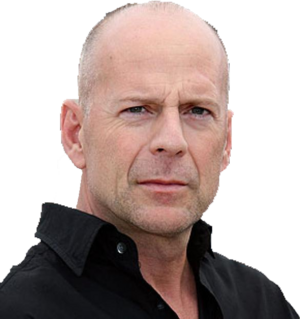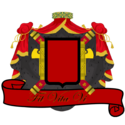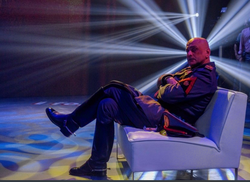Italo Debalti
| Italo Debalti | |||||
|---|---|---|---|---|---|
 Duce King Italo Debalti in 2008. | |||||
| Duce-King of Italy | |||||
| Reign | 28 October 2002 –present | ||||
| Ascension | 29 October 2002 | ||||
| Predecessor | Victor Emmanuel III | ||||
| Heir Apparent | Giulio, Duke of Rome | ||||
| Born | 20 April 1957 Florence, Italian Social Republic | ||||
| Spouse | Claudia Visentin | ||||
| Issue |
| ||||
| |||||
| House | Debalti | ||||
| Father | Carlo Andrea Debalti | ||||
| Mother | Rachele Cogeri | ||||
| Religion | Roman Catholic | ||||
 | |||||
| Military career | |||||
| Allegiance | |||||
| Service/ | Italian Armed Forces and Fascist Armed Corps | ||||
| Years of service | 1975–1977 (Italian National Royal Guard) 2002-present (Italian Armed Forces and Fascist Armed Corps) | ||||
| Rank | |||||
Italo Alessandro Benito Debalti (born 20 April 1957) is the second Duce and fourth King of Italy.
Italo Debalti has been Duce of Italy since 28 October 1991; he ascended the throne on 28 October 2002 upon the Proclamation of Royalty. His mother is Donna Sofía, and he has two younger brothers, Adolfo and Marco. In 1987, Italo married Claudia Visentin with whom he has two sons, Giulio (his heir presumptive) and Benito.
As monarch and Duce, he is head of state and commander-in-chief of the Italian Armed Forces, commander-in-chief of the Fascist Armed Corps, leader of the National Fascist Party and head of the Italian Empire.
Birth and early life
Italo was born at Careggi University Hospital in Florence, the firs of three sons of Carlo Andrea Debalti and Rachele Cogeri. He was baptised on 1 May 1957. He studied at Machiavelli High School from 1971 to 1975. In 1975, while 18, Italo Debalti joined the National Republican Guard as part of his military service and was graduated the following year. In 1977 he was honourably discharged from the G.N.R. and studied at the Università degli Studi "La Sapienza", where he graduated with a degree in Political Science in 1982.
Political career
Debalti joined the Italian Youth of the Lictor in 1963, and followed the normal course until 1977. In 1978 he applied to join the National Fascist Party and was accepted in 1979. He later became the Fascist University Group leader at the Sapienza University, leaving that post in 1982. In 1982, he was sent to Padua as deputy Federal party secretary of Padua Province. He was promoted in 1983 to Federal secretary, becoming the second-most junior Federal Secretary at the time. Debalti subsequently served in two other Provinces during his regional political career: Florence (1983-1984) and Como (1985–1986). From 1986 to 1989, Debalti held posts in the National Secretariat and became the president of the School of Fascist Mysticism in 1988.
Rise to power
Between the late 1980s and the early 1990s, Italy faced significant challenges, as radical fascists – disenchanted with political paralysis, massive public debt and the extensive corruption system (known as Tangentopoli) – imposed reforms. Scandals involved all major figures, but especially those in the Government: the Chief of Government committed suicide, while several other ministers were fired by the Chief of State. However, both economic situation and moral issues were too serious to be tolerated, especially by more intransigent and uncompromising Fascists. Following massive demonstrations and rallies - although disguised by the propaganda as pro-Regime gatherings - a new anti-capitalist and corporatist spirit rose within workers, medium and small employers and, mainly, Party.
On 23 March 1990, following a heated struggle within the Italian political leadership, Debalti was appointed National Secretary of the P.N.F. His appointment came in order to appease the mounting Fascist radical wave.
This discontent led to severe frictions between the Party, led by the now-powerful and beloved Secretary Italo Debalti, and the State organs and bodies, supported and backed by powerful undertakings and even by some communist infiltrated. This uncertain period ended in 23 March 1991 when, by a coup de main, Debalti imposed the resignation of the Chief of State, in return of a substantial immunity: however, Chief of State Scalfaro, a former judge, was only marginally involved into disguised liberal-democratic and capitalistic plots.
Duce of Italy
During the Spring 1991, Debalti placed several of his main supporters in positions of power and forced the Italian Parliament to order an institutional plebiscite, in order to cement his own power.
Following the Plebiscite of 29 July 1991, the institutional structure was heavily changed, marking the return to the unitary leading of the State under the new Duce, and recuperating several early Fascist ideas. However, the State was transformed in a non-Totalitarian State, marking the birth of non-aligned press, although still in a very weak position, and of some, limited, local para-democratic forms. The new Duce had to deal with three major issues: institutional reform, the disintegration of Soviet bloc (and the Yugoslav crisis) and, last but not least, the period of economic stagnation which involved all the advanced countries.
After the conquest of power, Duce Italo Debalti launched the institutional reform. The Parliament was restructured into a bicameral assembly; the lower house comprising social and economic representatives, the upper house being the central committee of the PNF. This marked clearly the ideological characterization of the State, although the primate of the State over the Fascist party was kept intact; the PNF was the expression of all non-economic demands of the Italian society, and these demands were integrated into the State by the Party itself. The economic structure, which was shifting toward liberal paradigms, was reshuffled, and reorganized according a view which includes the subordination of the economy against the policy. The primary effect was the weakening of the class association (both workers' and employers' unions) and the revamping of the Corporations.
In the early days of his regime, Debalti engaged in self-promotion before the Italian media, displaying his strength, fearlessness and masculinity. In his address to the nation, Debalti claimed that the government would hold elections in the future in order to temporarily appease the perceived liberal fifth columns in Italy.
Consolidation of power
Debalti notably departed from the collective leadership practices of his post-Mussolini predecessors. Between 1991 and 1993, he cemented his power and created working groups with himself at the head to control government bureaucracy, making himself become the unmistakable central figure of the government. Debalti has also been active in his participation in military affairs, taking a direct hands-on approach to military reform. In addition to being the commander-in-chief of the Italian Armed Forces and of the Fascist Armed Corps, Debalti delivered numerous high-profile pronouncements vowing to clean up malfeasance and complacency in the military, aiming to build a more effective fighting force. According to a University of California expert on Italian military, by 1994 Debalti was "able to take political control of the military".
Balkans
During mid-1990s, the main external challenges came from the immediate East. The Italian Social Republic was deeply involved into the deep crisis faced by the Yugoslav Socialist Federal Republic; in order to alleviate internal tensions, the new Serbian leadership of the Federal Republic emphasized the sub-national Croatian irredentism against the portion of Dalmatia held by Italy. This resulted in a deepened tension across the Italian-Croatian border, which ended with some minor clashes. Also some Slovenian nationalists clashed with Italian border police in 1993, while the Albania-Kosovo border remained quiet.
The Italian-Yugoslavian crisis ended in 1994. In order to avoid to be excluded by the peace process and by the influence into the region, Italo Debalti sent peacekeeping troops alongside Western powers and Russia. In 1999 the NATO attacked from air the Yugoslavian Federation (the new name of Yugoslavia), on the hypothetical grounds of an ethnic cleansing against the Albanian minority. Italy stood in an intermediate position, advocating the annexation of Albania of the areas nearest to the border, where the Albanian population was an overwhelming majority, and providing large refugee camps (later towns were built in their place) in Albania. The bombing campaign resulted in massive destructions around both the federal capital Sarajevo and the Serbian capital Belgrade but the Yugoslav Federation did not crumble into pieces, also due to the Russian, Hungarian and Greek support and to the covert German-French support; this caused severe unrest in Montenegro, which proclaimed its independence and subsequently asked for the Italian annexation.
Yugoslavian-Italian talks were unusually brief: the Yugoslavian elite did not want a peripheral and poor member which clearly said that it did not want to be a member; therefore the Independent State of Montenegro ended on October 27, 1999, and the Autonomous Republic of Montenegro was born the following day. While during 1990s the primary concern was represented by the Balkans, once partly nullified the Anglo-American intervention, the no. 1 public enemy became Italy. Against the renewed Fascist regime several mass rallies were held in all European and North American major cities.
King of Italy
In July 2001, Debalti dissolved the government and replaced it with the Italian Revolutionary Council. On 9 September 2001, at the P.N.F. Programmatic Conference, Debalti first officially announced the monarchical turn of direction. On 23 March 2002, Duce Italo Debalti announced his intent to assume the Crown of a renewed (i.e. without dynastic or direct links to the Savoys' monarchy) Kingdom of Italy.
On 28 October 2002, Debalti ascended the throne at the stroke of midnight. The next morning, after rewieving the troops, he was formally sworn in and proclaimed Duce and King of Italy united within the P.N.F., Duce and Emperor of Ethiopia, King of Albania, King of Libya, King of Montenegro, Prince of Eritrea, Perpetual Vicar of Somalia. His regalia, coronation ceremony and regime of the newly formed Kingdom of Italy have been largely inspired since by the Risorgimento and by Napoleon I of France, who had converted the French Revolutionary Republic of which he was First Consul into the First French Empire.
Debalti at first claimed that the new Kingdom would be a constitutional monarchy. In practice, however, he has retained the same dictatorial powers he had held as Duce of the Italian Social Republic, and the country has remained a Fascist Regime.

